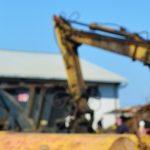HOW TO IDENTIFY WHAT SCRAP METAL YOU HAVE
This useful guide looks at how to identify scrap metals quickly and easily without needing any specialist tools or equipment.
When faced with scrap metal that you may be unfamiliar with, or if you are new to scrapping metals, you may be struggling to identify what scrap metal you have (and maybe more importantly, is it the valuable sort).
Some metals can be quite similar in appearance, texture and weight and it can be tricky to differentiate one metal from another.
We’ve put some handy tips together to help you to quickly determine what scrap metal you may have.
Let’s get started!
Identifying scrap metals by their colour
Putting painted metals to one side for now, some metals have distinctive colourings making them fairly easy to identity. Of all scrap metals, copper is probably the most distinctive being fiery red-orange, with hints of pinks and browns.
In contrast, brass is generally more solid in colour and is yellow-brown in appearance.
Keeping with the look of the metal, the finish can also be a good way to identify a metal. Aluminium is grey in colour and has a fairly dull texture, whereas steel is more silvery with a relatively shiny finish.
Rusted or painted metals may be difficult to identify. We would always suggest carefully removing a little of the paint or rust to get a more detailed look at the actual metal.
Is the metal magnetic?
A great way to work out what metal you have is to test to see if it is magnetic.
Ferrous metals, such as iron, nickel and cobalt, contain iron and are magnetic. Some common items that are made from ferrous metals include: radiators, iron gates and wrought iron railings. These will all be magnetic and items that customers could bring in to us.
Non-ferrous metals (metals that don’t contain iron and are not magnetic) include: aluminium, copper, lead, nickel, tin, brass and bronze.
We accept both ferrous and non-ferrous. Take a look at this guide to see what scrap metals we accept
Identifying scrap metal by how hard/soft it is
Now, we are not suggesting that you take a hammer to your scrap metal, but one great way to identify a metal is to see how hard it is. Some metals, such as copper, aluminium and brass are fairly malleable – they can be shaped/dented without too much effort. Other metals, for example steel and lead are quite hard and would require machinery or specialist tools to reshape.
Using weight to identify scrap metal
Simply holding and feeling the weight of scrap metal is a quick way to identify the type of metal it is. Metals like aluminium and aluminium alloys are very lightweight, whereas even a small amount of steel or lead are significantly heavier.
Still not sure? We’re here to help!
Professional testing of scrap metal
At Kas Metal, we have world-class equipment that quickly and accurately tests metal alloys, from trace levels to commercially pure metals.
Our friendly and experienced team are also on hand to help identify metals and to offer advice in person or over the phone.
Scrap metal recycling at a scrap yard near Atherton, Bolton, Wigan, Manchester, Leigh
With the best service and most competitive prices, you won’t want to go anywhere else!
We are located in Prestwich Industrial Estate in Atherton, just off the A577.
We serve clients from all over Manchester and surrounding areas – including: Wigan, Tyldesley, Bolton, Leigh, Worsley and Salford.




